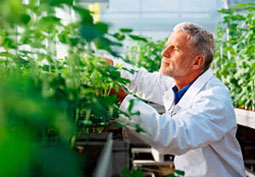Biotechnology: Innovation, Solution and Political Hurdles
 From new drugs that address our medical needs to industrial processes that use renewable feedstock instead of crude oil, and crops that are able to grow in harsh climatic conditions and ensure safe and affordable food, biotech can and will increasingly pay economic, social and environmental dividends.
From new drugs that address our medical needs to industrial processes that use renewable feedstock instead of crude oil, and crops that are able to grow in harsh climatic conditions and ensure safe and affordable food, biotech can and will increasingly pay economic, social and environmental dividends.
At the European Commission’s Horizon 2020 launch in November 2011, biotechnology was identified as one of the six enabling technologies that can boost the European economy. No other industry is better placed to enhance quality of life and respond to society’s ‘Grand Challenges’ of tackling an ageing and ever increasing population, healthcare choice and affordability, resource efficiency, food security, climate change and energy shortages.
A highly dynamic and research-intensive industry
 Biotech companies spend up to 40% of their budget on Research & Development (R&D), three times more than the pharmaceutical industry. According to the OECD, the European biotech industry generated € 13 billion revenues in 2010. Healthcare biotech is estimated to already account for more than 20% of all marketed medicines and by 2015, 50% of all medicines are expected to come from biotech. Europe produces about 75% of the world’s enzymes used in industrial processes, and provides approximately 22 million jobs to European citizens.
Biotech companies spend up to 40% of their budget on Research & Development (R&D), three times more than the pharmaceutical industry. According to the OECD, the European biotech industry generated € 13 billion revenues in 2010. Healthcare biotech is estimated to already account for more than 20% of all marketed medicines and by 2015, 50% of all medicines are expected to come from biotech. Europe produces about 75% of the world’s enzymes used in industrial processes, and provides approximately 22 million jobs to European citizens.
All of these bold technologies, and those that are still in the pipeline, promise a brighter future for Europe. But for this to happen, the industry requires sounds policy decisions that support innovation and risk–taking as well as a public that is well informed about how biotech is creating a healthier, greener, more productive and more sustainable economy. This is particularly true for agricultural biotechnology, whose development in Europe is hampered by political stalemate on the approval of genetically-modified crops.
Agriculture biotech: from plant discovery to political ideology
 Biotechnology in agriculture encompasses a range of modern plant breeding techniques, enabling farmers to solve issues around food production, such as yield losses caused by crop diseases, water shortages and other climate change related stress. Plant biotechnology is a key technology for the 21st century; it brings scientific breakthrough and technical applications that will help the world face food, demographic and environmental challenges.
Biotechnology in agriculture encompasses a range of modern plant breeding techniques, enabling farmers to solve issues around food production, such as yield losses caused by crop diseases, water shortages and other climate change related stress. Plant biotechnology is a key technology for the 21st century; it brings scientific breakthrough and technical applications that will help the world face food, demographic and environmental challenges.
European institutions have assessed the safety of GM products submitted for market approval in the European Union. However, the European Commission is failing to comply with its own rules, and some national governments are taking illegal actions preventing GM crops to access the market and be made available to local farmers. In a recent decision against Italy, the European Court of Justice declared that “the cultivation of genetically modified organisms cannot be subject to a national authorization procedure when the use and marketing of those varieties are authorized”, confirming that the national bans on approved GM crops are unlawful.
Today, more than 16 million farmers are growing GM crops around the world.
These governments are hiding political interests behind supposedly ‘anti-GM’ attitude of their peoples. However, recent studies show that consumer perceptions in the EU are actually becoming more favourable towards GM foods. A 2006 report entitled ‘GM Foods: What Europeans Really Think’, also showed that “phrases like ‘overwhelming opposition’ and ‘massive consumer rejection’, which have been used in the media and by some politicians in relation to public attitudes to GM foods, present a misleading impression of what the research is actually saying”. According to a 2010 Eurobarometer on food related risks, only 8% of Europeans spontaneously say they are worried about GM in food. Although there is concern about GM and biotechnology, consumers report a low level of knowledge about GM food.
A set of tools to increase productivity and competitiveness of European agriculture
 Farmers in Europe currently have two GM products that they are allowed to plant, while American farmers have 80 products they can use. While productivity in Europe is slowing, in America, over the last 15 years, productivity in maize and soya and cotton has jumped significantly since they implemented the use of GMOs.
Farmers in Europe currently have two GM products that they are allowed to plant, while American farmers have 80 products they can use. While productivity in Europe is slowing, in America, over the last 15 years, productivity in maize and soya and cotton has jumped significantly since they implemented the use of GMOs.
Today, more than 16 million farmers are growing GM crops around the world. If more GM crops were grown in Europe today, the increase in production could be equal to the output from land the size of Belgium every year. As a result, the Europe’s economy could be boosted by € 443 and € 929 million each year.
So with all these benefits, why do governments prohibit farmers from taking their share of the cake?
Lack of vision causes trade disruptions in a highly food import dependent Europe
The position of some European governments is even more difficult to understand, as GM crops already enter the EU through trade. On average, Europe imports 30-40 million tons of protein crops every year, such as soy to feed animals. More than 90% of this imported protein is genetically modified.
 The current EU stance towards GM not only affects the biotech industry but negatively impacts various actors along the food supply chain. 45 GM crops are authorised for import into the EU. This compares to about 90 approved GM crops in the US. GM approvals take an average of 45 months compared to 25 to 30 months in major commodity exporting countries.
The current EU stance towards GM not only affects the biotech industry but negatively impacts various actors along the food supply chain. 45 GM crops are authorised for import into the EU. This compares to about 90 approved GM crops in the US. GM approvals take an average of 45 months compared to 25 to 30 months in major commodity exporting countries.
Due to the backlog of unapproved products, it is more likely that as yet unapproved GM products will be found in shipments. Without predictability in Europe, the food industry, commodity traders, and livestock farmers will face even greater challenges in the future. For animal feed alone, if there are trade disruptions due to unapproved GM material, a 2010 European Commission report estimated that profits could decrease by € 1.2 billion for the dairy sector, by € 3 billion for the beef sector, by € 1 billion for the pork meat sector, and by € 380 million for the poultry meat sector.
Human and financial capitals are leaving Europe
Moreover, the cost of such a position on European competitiveness and Europe’s position as a leader in biotech research is extremely high: brain drain to more attractive markets, significant decrease in private investment for research in new biotech products, and a yet impalpable loss of EU scientific and economic influence in the world trade. This is illustrated by the decision taken in 2011 by BASF to move its Plant Science Division Headquarters from Germany to the US. Similarly, investment flows also tend to find better breeding grounds in Asia or the Americas.
Ray of hope: new biotech research may give another opportunity for Europe to catch up
 New products in the R&D pipeline are very promising. By developing improved and adapted agricultural crops such as drought or saline resistant plants, or crops that should deliver consumer health benefits such as biofortification with nutrients, agricultural biotech offers new solutions to farmers.
New products in the R&D pipeline are very promising. By developing improved and adapted agricultural crops such as drought or saline resistant plants, or crops that should deliver consumer health benefits such as biofortification with nutrients, agricultural biotech offers new solutions to farmers.
Here is the question that we should now be asking ourselves: does Europe want to take part in the exciting and full of potential biotech journey or just wait and spend billions of Euros trying to put a plaster on massive outflows to justify its illogical and even in some cases illegal political approach? This is the time for all of us as citizens of Europe to reconsider our views and make sure our leaders think beyond borders.


